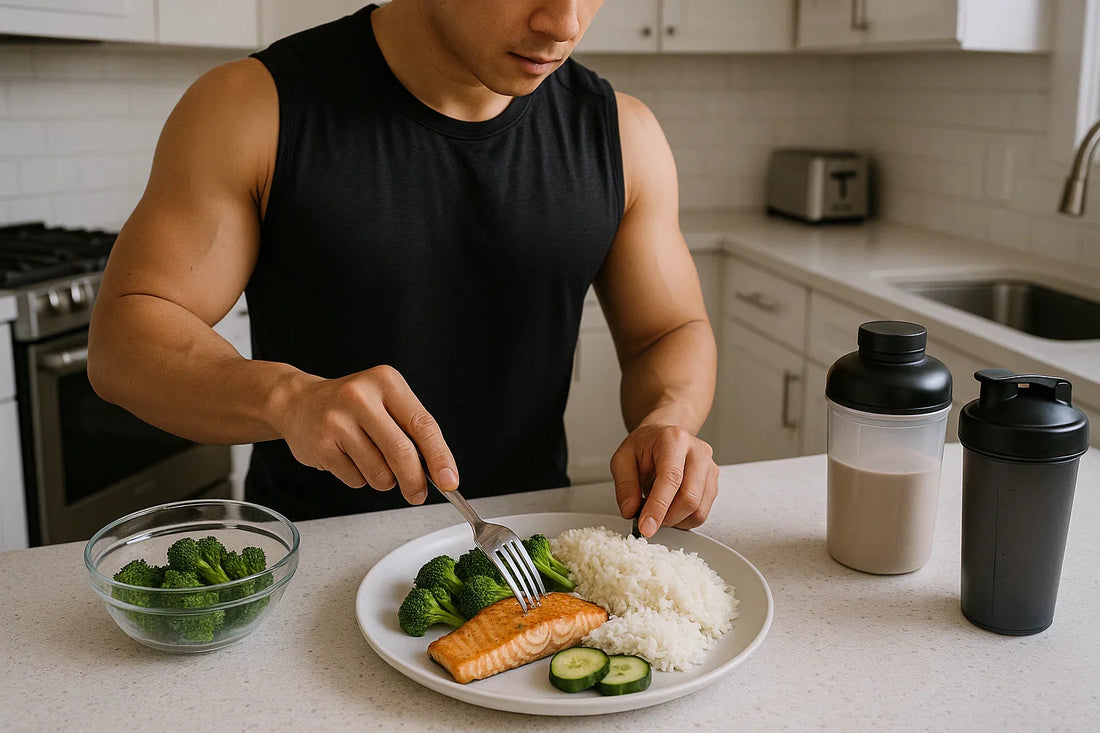
Fuel Like a Hybrid Athlete: Nutrition Rules for Training Across Disciplines
Share
Stop Eating Like a Bodybuilder or a Runner — You’re Both.

Most nutrition advice is designed for specialists:
-
🏋️ Lifters told to eat 4000 calories of dry chicken and rice
-
🏃 Runners told to live off bananas and gels
But if you're training across strength, endurance, and mobility, you're not a specialist — you're a hybrid athlete.
This guide breaks down how to fuel for hybrid performance:
-
Without getting fat
-
Without feeling flat
-
Without eating like a robot
The Hybrid Nutrition Equation: Balanced, Adaptive, Intentional
Hybrid athletes need to:
-
Lift heavy (muscle tension + CNS demand)
-
Run far/fast (glycogen + endurance)
-
Move well (joints, digestion, mental clarity)
That means your fuel must be:
-
High quality
-
Sufficient in quantity
-
Flexible based on your training demands
1. Set Your Protein (Non-Negotiable)
📌 Target: 1.8–2.2g per kg of bodyweight daily
Why? Muscle repair, strength retention, satiety.
Best sources:
-
Eggs, fish, lean meats
-
Cricket protein (check out Evöq’s Acheta+)
-
Greek yogurt, whey, tofu, lentils
Pro tip: Spread protein across 3–4 meals. Don’t save it all for dinner.
2. Adjust Carbs to Match Your Output
Carbs are your fuel. You’ll need more on days with:
-
Intervals
-
Long runs
-
Hybrid WODs
📌 General guideline:
-
Low/moderate days: 3–4g/kg
-
High-intensity or race prep: 5–6g/kg+
Good carbs:
-
Rice, potatoes, oats
-
Bananas, berries, sourdough
-
Wholegrains, local fruit
Avoid ultra-processed snacks. Fuel doesn't need to be fake.
3. Don’t Fear Fats — Especially for Recovery
Fats aid in:
-
Hormone function
-
Anti-inflammatory recovery
-
Long-lasting energy (especially for longer runs or fasted cardio)
📌 Target: 0.8–1.2g/kg
Stick to quality fats:
-
Salmon, whole eggs, avocado
-
Olive oil, nuts, chia seeds
Keep fats lower around intense sessions to avoid sluggish digestion.
4. Timing > Perfection
You don’t need a rigid meal plan. But when you eat matters.
Pre-workout (60–90 mins):
-
Carbs + some protein
-
Low fat, low fibre
→ Banana + protein shake, rice cakes + peanut butter
Post-workout:
-
Protein + fast carbs
→ Chicken wrap, rice + eggs, protein oats
Throughout the day:
-
Hydrate, sip electrolytes, don’t overthink
5. Your Gut Is a Training Tool Too
If you're bloated, inflamed or gassy all the time — your performance suffers.
Fix it:
-
Limit artificial sweeteners and protein bars
-
Chew slow. Eat seated.
-
Try fermented foods (kimchi, miso, yogurt)
-
Take digestive enzymes or greens if needed
Sample Hybrid Day (Training at 7PM)
-
8AM: Overnight oats + eggs + coffee
-
12PM: Rice, salmon, veggies + olive oil
-
4:30PM: Banana + protein + bit of honey
-
7PM: Training
-
8:30PM: Chicken + potatoes + yogurt
-
10PM: Casein shake or boiled eggs if hungry
You’re now fuelling for both output and recovery.
Evöq: The Hybrid System That Extends Into Your Kitchen

At Evöq, we don’t just build gear — we build systems for performance.
That’s why our upcoming August 2025 apparel drop features hybrid-ready gear that performs across gym, court, and café — but also aligns with your lifestyle.
Because how you fuel and how you train go hand-in-hand.
Final Thought: Eat to Move, Not Just to Look Good
Your food isn’t for flexing on IG.
It’s fuel for lifting, running, recovering, and playing at your best.
If you want elite output, you need elite input — clean, functional, sustainable.
This is hybrid eating.
This is The Ö Blueprint.
